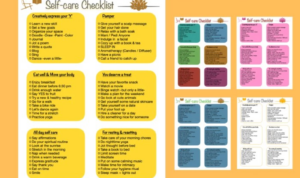Kicking off with Healthy Lifestyle Tips, this opening paragraph is designed to captivate and engage the readers, setting the tone for an informative journey through the world of health and wellness.
Whether you’re looking to improve your nutrition, fitness, mental health, or sleep habits, this guide has got you covered with practical tips and advice.
Importance of a Healthy Lifestyle
Living a healthy lifestyle is crucial for maintaining overall well-being and improving quality of life. By adopting healthy habits, individuals can experience a wide range of benefits that positively impact their physical, mental, and emotional health.
Benefits of Adopting a Healthy Lifestyle
- Increased energy levels and stamina, leading to improved productivity and focus in daily activities.
- Reduced risk of chronic diseases such as heart disease, diabetes, and obesity, promoting longevity and a higher quality of life.
- Enhanced mood and mental health, with lower levels of stress and anxiety, contributing to a more positive outlook on life.
- Better weight management and body composition, leading to increased self-confidence and overall body image.
Positive Outcomes from Maintaining a Healthy Lifestyle
- Improved cardiovascular health, with lower blood pressure and cholesterol levels, reducing the risk of heart-related conditions.
- Enhanced immune system function, providing better protection against illnesses and infections.
- Better sleep quality, allowing for restful and rejuvenating sleep cycles that support overall well-being.
- Increased longevity and a higher quality of life, with the ability to enjoy life to the fullest for a longer period of time.
Nutrition Tips for a Healthy Lifestyle
Eating a balanced diet is essential for maintaining a healthy lifestyle. It provides the necessary nutrients for the body to function properly and helps prevent various health conditions. Hydration is also crucial as it supports digestion, circulation, and overall bodily functions. Including nutrient-rich foods in your daily diet can help you feel energized and promote overall well-being.
Creating a Balanced Diet
A balanced diet consists of a variety of foods from different food groups. This includes:
- Fruits and vegetables: rich in vitamins, minerals, and antioxidants.
- Whole grains: provide fiber and energy.
- Lean proteins: essential for muscle repair and growth.
- Healthy fats: such as nuts, seeds, and avocados for brain health and hormone regulation.
Importance of Hydration
Hydration is key to maintaining a healthy lifestyle as water is essential for various bodily functions, including:
- Regulating body temperature
- Transporting nutrients and oxygen throughout the body
- Removing waste and toxins
Remember to drink at least 8 glasses of water a day to stay hydrated.
Nutrient-Rich Foods to Include
Examples of foods rich in nutrients that you should include in your daily diet are:
- Salmon: a great source of omega-3 fatty acids for heart health.
- Spinach: packed with iron, vitamins, and antioxidants.
- Greek yogurt: high in protein and probiotics for gut health.
- Blueberries: rich in antioxidants and vitamins for overall wellness.
Exercise and Fitness Recommendations: Healthy Lifestyle Tips

Regular physical activity is crucial for maintaining overall health and well-being. Exercise helps improve cardiovascular health, boost mood, increase energy levels, and manage weight effectively.
Types of Exercises for Various Fitness Levels
- Low-intensity exercises: Walking, yoga, and swimming are great options for beginners or those with mobility issues.
- Moderate-intensity exercises: Jogging, cycling, and dancing can help improve fitness levels gradually.
- High-intensity exercises: HIIT workouts, running, and weight training are suitable for individuals looking to challenge themselves and improve strength and endurance.
Incorporating Exercise into a Busy Schedule
- Schedule workouts like appointments to prioritize exercise.
- Opt for quick, high-intensity workouts to maximize limited time.
- Combine exercise with daily activities like walking or biking to work.
- Utilize home workout videos or apps for convenience and flexibility.
Mental Health and Well-being Practices
Maintaining good mental health is essential for overall well-being. It involves reducing stress, practicing self-care, and engaging in mindfulness exercises. Here are some strategies to help you promote mental wellness:
Reducing Stress, Healthy Lifestyle Tips
- Practice deep breathing exercises to calm the mind and body.
- Engage in physical activities like yoga or meditation to release tension.
- Set boundaries and learn to say no to avoid overwhelming yourself.
- Connect with friends and family for emotional support.
Self-Care Routines
- Establish a regular sleep schedule to ensure proper rest and rejuvenation.
- Engage in activities you enjoy, such as hobbies or creative outlets.
- Take breaks when needed and prioritize your mental health over other obligations.
- Practice gratitude by reflecting on positive aspects of your life.
Mindfulness Exercises
- Try mindful breathing exercises to stay present in the moment.
- Practice body scan meditation to connect with your physical sensations.
- Engage in mindful walking by focusing on each step you take.
- Use guided imagery to visualize calming scenes and reduce anxiety.
Sleep Hygiene for a Healthy Lifestyle

Quality sleep is essential for maintaining overall health, both mentally and physically. It plays a crucial role in regulating mood, improving cognitive function, and supporting overall well-being. Inadequate sleep can lead to a range of health issues, including increased stress levels, weakened immune system, and a higher risk of chronic diseases.
Tips for Improving Sleep Hygiene
- Avoid caffeine and electronic devices close to bedtime to promote a relaxing environment for sleep.
- Establish a consistent sleep schedule by going to bed and waking up at the same time every day, even on weekends.
- Create a bedtime routine that includes calming activities like reading or listening to soothing music to signal to your body that it’s time to wind down.
- Make sure your sleep environment is conducive to rest by keeping your bedroom dark, cool, and quiet.
- Avoid large meals and vigorous exercise close to bedtime, as they can disrupt your sleep patterns.
Impact of Adequate Sleep on Health
Adequate sleep is crucial for maintaining optimal mental and physical health. It helps improve concentration, memory, and decision-making skills, while also supporting immune function and overall longevity. By prioritizing quality sleep, you can enhance your overall well-being and lead a healthier lifestyle.


